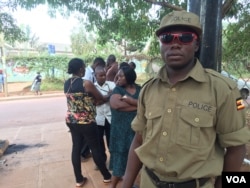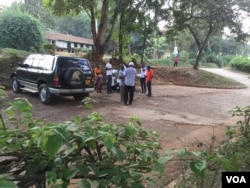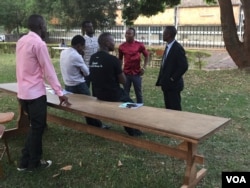Police in Uganda briefly arrested presidential candidate Kizza Besigye on Thursday after he tried to enter a house he said was being used for rigging the national elections.
VOA's Swahili service said Besigye was released later in the day and taken to his home in Kasangati, north of the capital, Kampala. It was not clear whether he was being placed under house arrest.
A Ugandan newspaper, the Daily Monitor, said Besigye and a group of supporters accused authorities of pre-marking ballots and manipulating election results in the house, located in a Kampala suburb, Naguru. Police blocked the candidate from getting inside the home.
With the polls closed, vote tabulation was underway. Ugandans appeared to have turned out in large numbers to cast ballots Thursday for president, parliament and local government seats. More than 15 million Ugandans were registered to vote.
President Yoweri Museveni, in power for 30 years, faced a challenge from seven opponents, most prominently Besigye, who lost to him in three previous elections.
Uganda's Electoral Commission extended voting by three hours in some parts of Kampala and nearby Wakiso after many polling stations opened late, often because of late-arriving ballot papers.
At one station in Kampala, police fired tear gas to disperse angry residents who had waited seven hours in line, only to find there were no ballots for the presidential poll.
The delays led some voters to question whether the election was being conducted fairly. Makerere University education student Ivan Ssebuliba said, "If this is happening in Kampala, so close to the Electoral Commission, what is going on in the villages?"
At another polling station near the Electoral Commission, polling observer Simon Katum said about 200 voters had been left off the official register.
Still others were upset by a block on social media sites such as Twitter, Facebook and Instagram. The head of the Uganda's Communications Commission said the sites were blocked for "security reasons."
Besigye accused Museveni and the ruling NRM party of using poll-rigging and intimidation of voters to secure victory in the 2006 and 2011 elections.
VOA's Lizabeth Paulat contributed to this report








